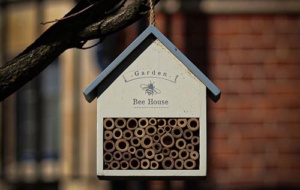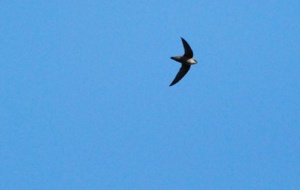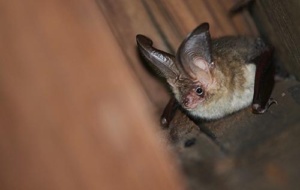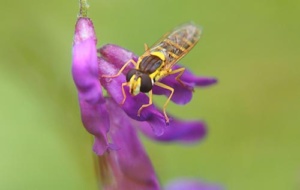Biodiversity & ecology at Univ North
 How is biodiversity and ecology being considered at Univ North?
How is biodiversity and ecology being considered at Univ North?
Species and habitat diversity have never before been so important on every scale than in today’s context as we try to manage the impact of climate change and global biodiversity loss. Sustaining and improving habitat and linking green corridors throughout North Oxford is a local and very real opportunity to help make a difference as we conserve our green space at Univ North.
We’re fortunate to have an expert team at Univ who have focused on research and planning for Univ North, where an enhanced collegiate community in North Oxford will benefit from new and improved accommodation and facilities, gardens landscaped for wildlife benefits, rejuvenated heritage orchards and an environment focused on wellbeing, sustainability and shared purpose.
We undertook a Preliminary Ecological Appraisal of the site (2019) to inform the early stage planning of the project. While it became clear that we could continue to provide a good habitat for roosting bats, it was unlikely that the site hosted other protected species at that time. An assessment of the proposed development scheme’s biodiversity impact was undertaken and the Habitat Biodiversity Impact Score of +1.20 units recorded. This equates to a creditworthy 16.77% increase in biodiversity units post-development when compared to the site as it was at the time of the survey.
In addition, Univ has sought the specialist services of Future Nature WTC (The Wildlife Trusts Consultancies) both to peer review the 2019 impact survey and commission a Landscape and Ecological Management Plan (2021) for the ongoing wildlife management of the site for 10 years following completion. This plan will ensure that the long-term biodiversity potential of the site is not only achieved but that interventions over time ensure that we strive to exceed our targets. We are pleased to have the ongoing support of the Wildlife Trust.
The independent Biodiversity Net Gain (BNG) Assessment identified that a net gain of over 20% is achievable if newly created grassland meets its potential over a defined timescale. Meadow grass managed in accordance with a long grass policy enjoys significantly higher ecological value than lawn, particularly when combined with no pesticide/no fertiliser regimes, which encourage good colonisers and less competitive wildflower species.
Angela Unsworth, Domestic Bursar and Fellow, Univ, explains: “The initial stages of recovering the site immediately after the development are very important to us and we will work closely with our chosen contractors to ensure that the site is well set for habitat creation. We are delighted that our creation of new species-rich hedgerows is likely to generate in excess of 300% linear net gain on the site, some of which we have planted already in the Fairfield orchard to the north of the residential home. The increased diversity of native flora will by its very nature increase the diversity of local invertebrate species, encouraging a richer soil fauna, and supporting a broader range and higher density of small mammals in turn. Improved food sources, foraging and nesting opportunities will all add to the diversity of the site over time and encourage the new landscapes to be the rich network for wildlife that we all hope for in our gardens.”
In recent submissions to Oxford City Council, we included the detailing of eco enhancements, such as the incorporation of swift bricks, bat blocks, hedgehog domes and invertebrate houses as part of the development. You can explore further details of these here:
15 Swift Bricks
8 Bat Bricks/Blocks
2 Hedgehog Domes
8 Invertebrate Houses
A Construction Environmental Management Plan has been submitted to the Council for evaluation. This document sets out the strategy to minimise the disruption that often comes with developments. In this instance, it is very much focused on addressing the impact on residents, including, for example, vehicle movements associated with the proposed demolition and construction works at the Univ North site. The plan was compiled in liaison with our close neighbours at the Fairfield Residential Home and those on neighbouring streets through consultation to help minimise the potential inconvenience to day-to-day activities. This submission has been greatly assisted through close cooperation and input from the Univ North Neighbourhood Review Group (UNNRG).
Univ North Neighbourhood Review Group
The UNNRG, comprising neighbours from the surrounding area and Univ team members including the design team, meets as a monthly forum to discuss matters of impact. The UNNRG first came together in January 2021 to facilitate discussion and help resolve any issues arising from the management of Univ North and the implementation of Univ North planning consent, with scope to include matters related to environmental concerns as they pertain to the site.
Scott Walker, Project Manager, Univ North, said: “We’ve been working together to listen, discuss and take action on a range of topics to help develop an atmosphere of mutual trust and understanding. Together we have been able to develop solutions to issues, such as addressing smoking/litter nuisance and problem lighting, as well as the management of the treescape across the site. We’ve reviewed proposals together for items, such as the future lighting strategy for Univ North, where one of our consultants gave a short presentation to the group at our last meeting.”
Several walkabout tours have been held with the neighbours to discuss ideas for garden management with a particular emphasis on sustainability and biodiversity, assisted by the Environmental Sub Group of the UNNRG. An example of the value of this engagement is the recent suggestion to retain wherever possible on-site, any of the felled timber as additional habitat for wildlife, thereby sequestering more carbon over a longer time period. These efforts have created confidence in the readiness to start site preparation for Phase 1 and associated demolition activity, which we plan to begin this winter in readiness for the commencement of construction in spring 2023.
Andrew Grant, Finance Bursar, Fellow and Univ North Project Director said: “We continue to work with our neighbours and are pleased to incorporate the many positive inputs into the project. It is genuinely exciting to see everyone sharing their wealth of experience as the development can only be richer and more deeply appreciated as a consequence. We are grateful for all of the valuable contributions to date.”
You can read more about the College’s vision for its complementary community, and our latest developments, on the Univ North microsite.
Published: 1 July 2022

 A swift brick has a hollow interior for the swifts and indeed house sparrows, house martins, blue tits, great tits, starlings and nut hatches to nest in. The integrated bricks are also more aesthetically pleasing, maintenance-free, long-lasting, less prone to predation and less prone to temperature variations than traditional external boxes.
A swift brick has a hollow interior for the swifts and indeed house sparrows, house martins, blue tits, great tits, starlings and nut hatches to nest in. The integrated bricks are also more aesthetically pleasing, maintenance-free, long-lasting, less prone to predation and less prone to temperature variations than traditional external boxes. Something similar will be incorporated into the development to promote bat roosting. They will be positioned where they will be warmed by the sun and have a clear flightpath to and from the opening. Care will be taken to ensure that the openings are not lit by external lighting. These will also be positioned to ensure that cats cannot access the openings, as they can catch the bats as they leave the roost, so there will be no ledges near the opening.
Something similar will be incorporated into the development to promote bat roosting. They will be positioned where they will be warmed by the sun and have a clear flightpath to and from the opening. Care will be taken to ensure that the openings are not lit by external lighting. These will also be positioned to ensure that cats cannot access the openings, as they can catch the bats as they leave the roost, so there will be no ledges near the opening. These provide a spacious shelter to protect a family of hedgehogs from the threats that they can face on a daily basis. They allow the hedgehogs to seek refuge from predators and they are much safer than a compost heap. The small entrance deters predators, such as badgers, cats and dogs and can be used for long hibernation periods. Additional brushwood/twigs/leaves can be placed over the dome during winter for additional insulation.
These provide a spacious shelter to protect a family of hedgehogs from the threats that they can face on a daily basis. They allow the hedgehogs to seek refuge from predators and they are much safer than a compost heap. The small entrance deters predators, such as badgers, cats and dogs and can be used for long hibernation periods. Additional brushwood/twigs/leaves can be placed over the dome during winter for additional insulation. Also known as a bug hotel, an insect hotel or insect house, these are man-made structures created to provide shelter for insects, increasing overall biodiversity.
Also known as a bug hotel, an insect hotel or insect house, these are man-made structures created to provide shelter for insects, increasing overall biodiversity.